Women In Art
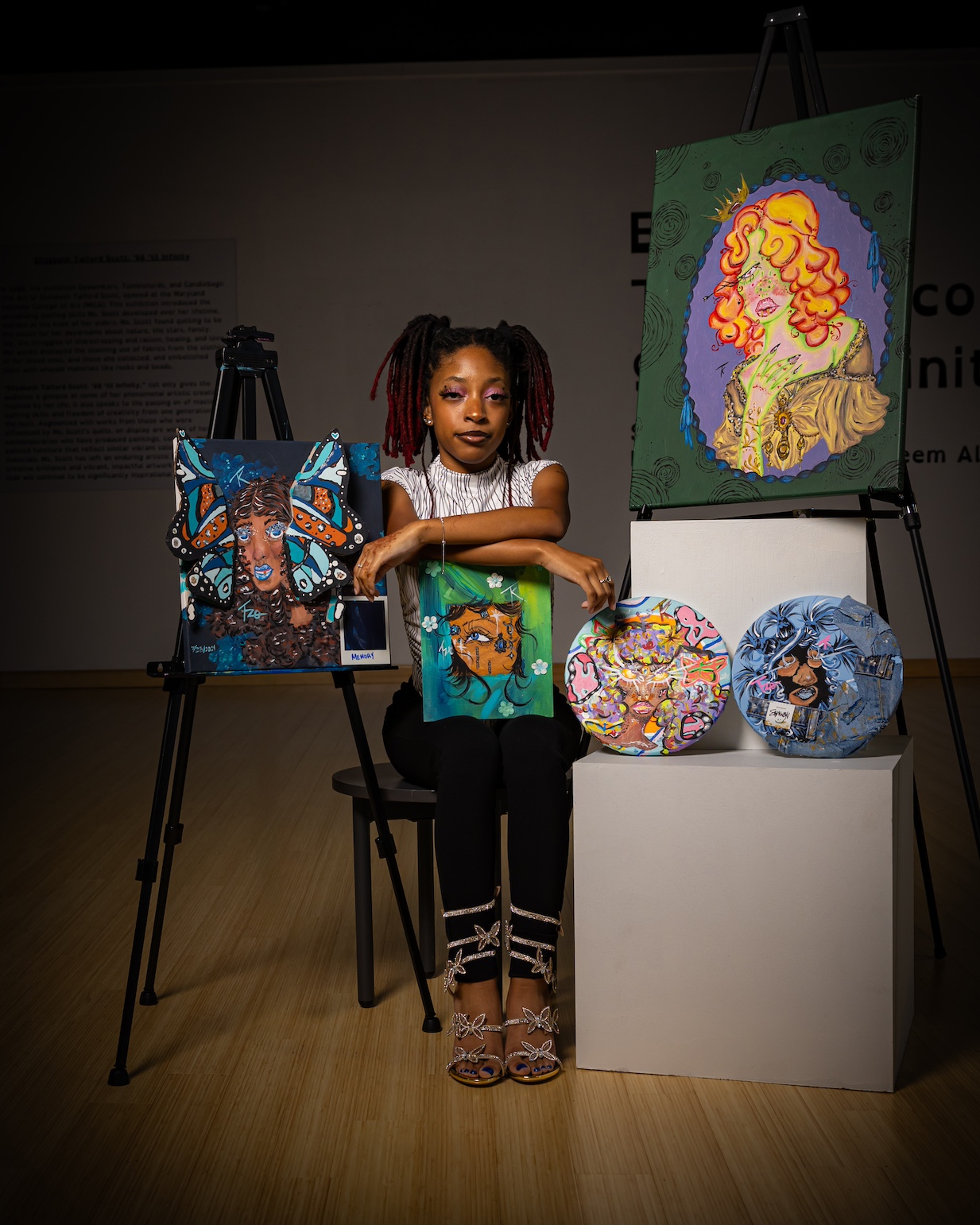
Meet SheROCKS 2026 Artist: Tori Carlisle (TzoArt)
Rooted in her upbringing in Maryland and a city-centered lifestyle, her work challenges narrow perceptions of urban environments, highlighting them as sites of creativity, movement, and possibility. As an emerging artist with a growing exhibition history, Tori reflects on finding confidence in her voice, learning from Black artists who came before her, and trusting experimentation as a core part of her process.
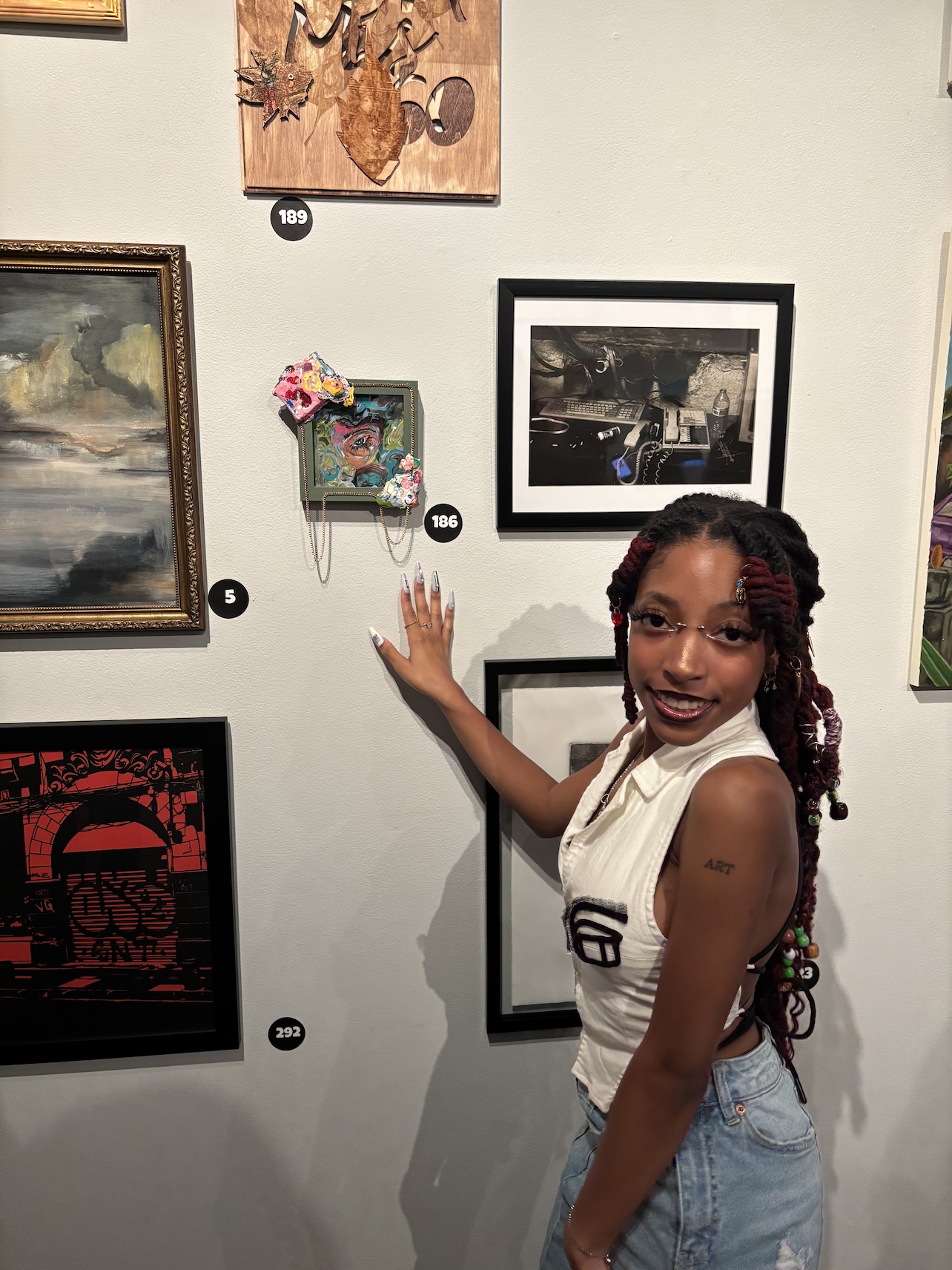
Q: What first drew you to the inner workings of the mind as a visual artist?
Tori: My first time working exploring the inner workings of the mind started when developing my AP portfolio in high school. My thesis was [about] how mental health affects artists and how they work.
Q: How do you decide which medium, or combination of mediums best brings a concept to life?
Tori: I feel like there is no singular medium that can do that. Only multiple mediums can achieve that, [bringing a concept to life].
Q: Growing up in Maryland and living a city-centered lifestyle, how does your environment shape the stories you want to tell visually?
Tori: Everyday where I live there are stories to tell. No day is the same and I don’t want it to be. Living in a city gives you constant room for inspiration to enter.
Q: You’ve shared your art “aims to bring light to people from urban backgrounds.” What narratives or experiences do you hope viewers see reflected in your pieces?
Tori: I hope that viewers can see that urban places aren’t as bad as they may seem or look on the outside. Urban backgrounds push for creativity and give you a creative outlet.
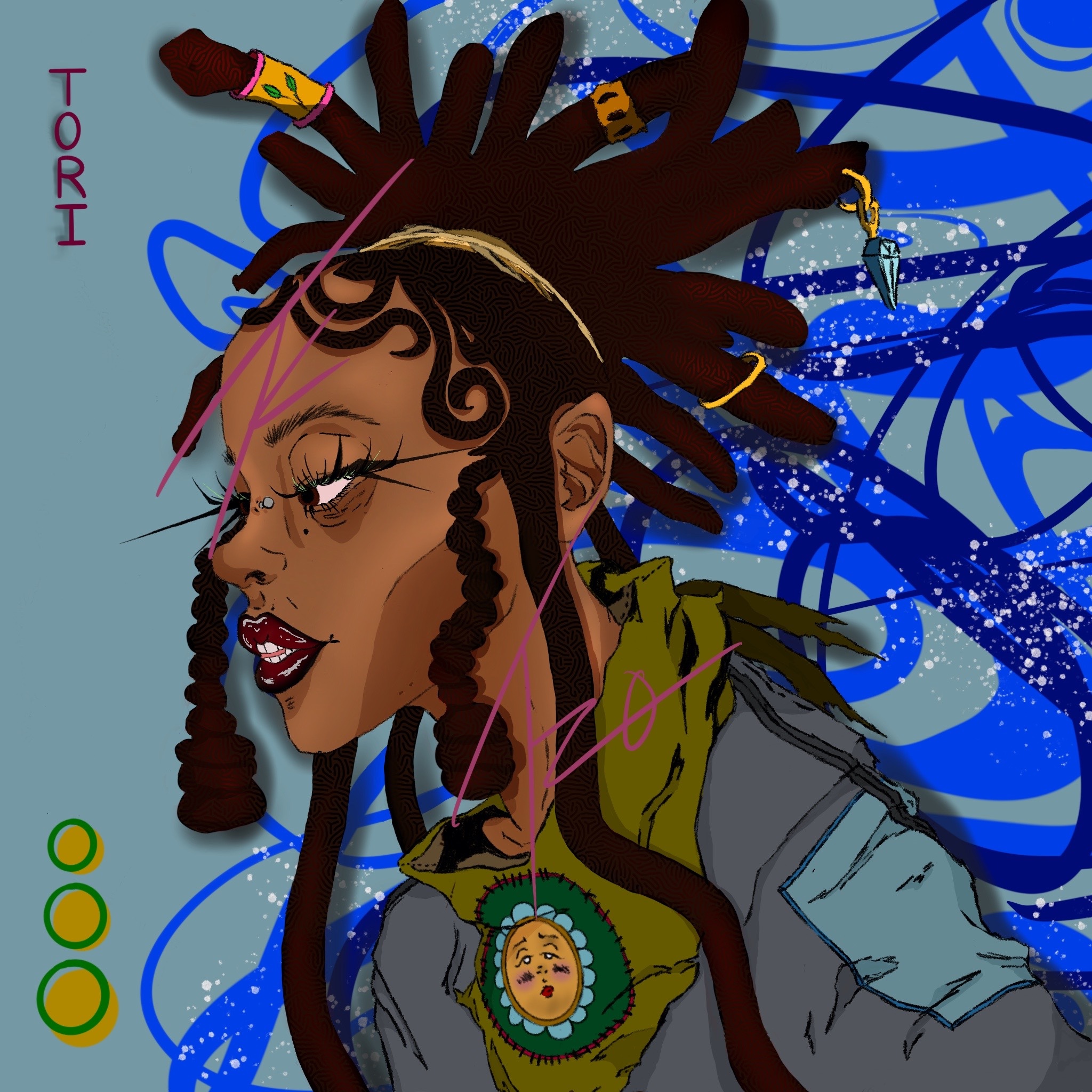
Q: You recently had your first solo exhibition showcasing your college portfolio. What did that milestone teach you about your voice as an artist?\
Tori: It taught me that being an artist is a passion and that it doesn’t matter what stage of your life you're in, you can inspire those older than you.
Q: What’s a medium or technique you’ve tested recently that surprised you?
Tori: The most recent medium that surprised me was using oil pastels and testing the limits of that.
Q: How do you balance scientific inspiration with emotional storytelling in your art?
Tori: In the past, my work focused more on mental health but as time goes on, I’ve focused more on human emotions and how that processes through the brain. I find it interesting to focus on a topic that is not really explored.
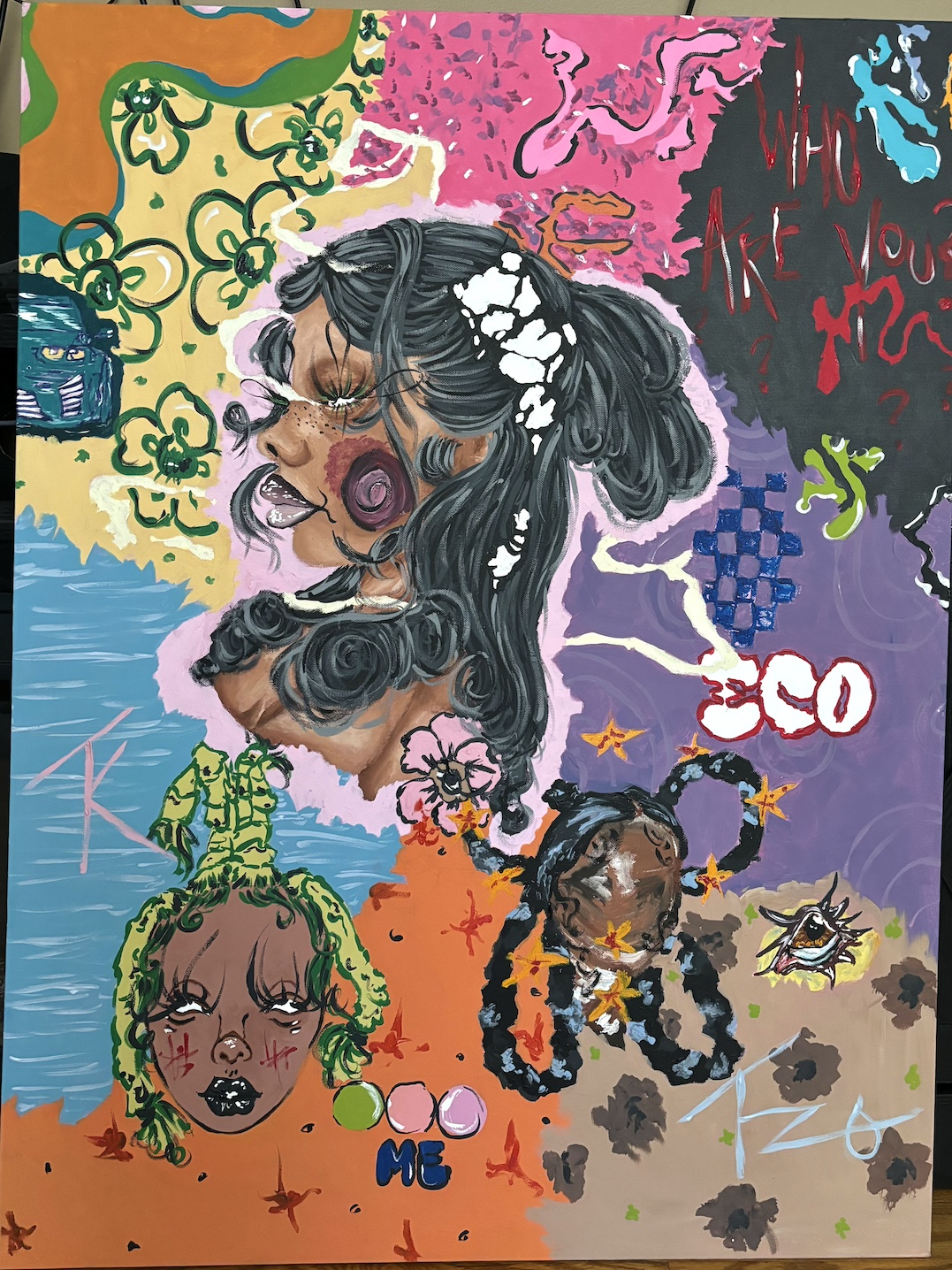
Q: As a college student, how has your academic journey expanded your understanding or approach to your craft?
Tori: During my academic journey I have learned more about African American art history and the periods of time in art. From this, it’s inspired me to be like the artists before me and make a way for myself.
Rapid Fire: What’s the one art tool or app you can’t go a day without using?
Tori: An app that I cannot go a day without using is Pinterest. Pinterest is filled with ideas and inspiration from all over the world.
Q: As you prepare for the March 2026 SheROCKS event, what part of presenting your work excites you the most?
Tori: The part that excites me the most is having more exposure towards my work and being able to be inspired by other artists as well.
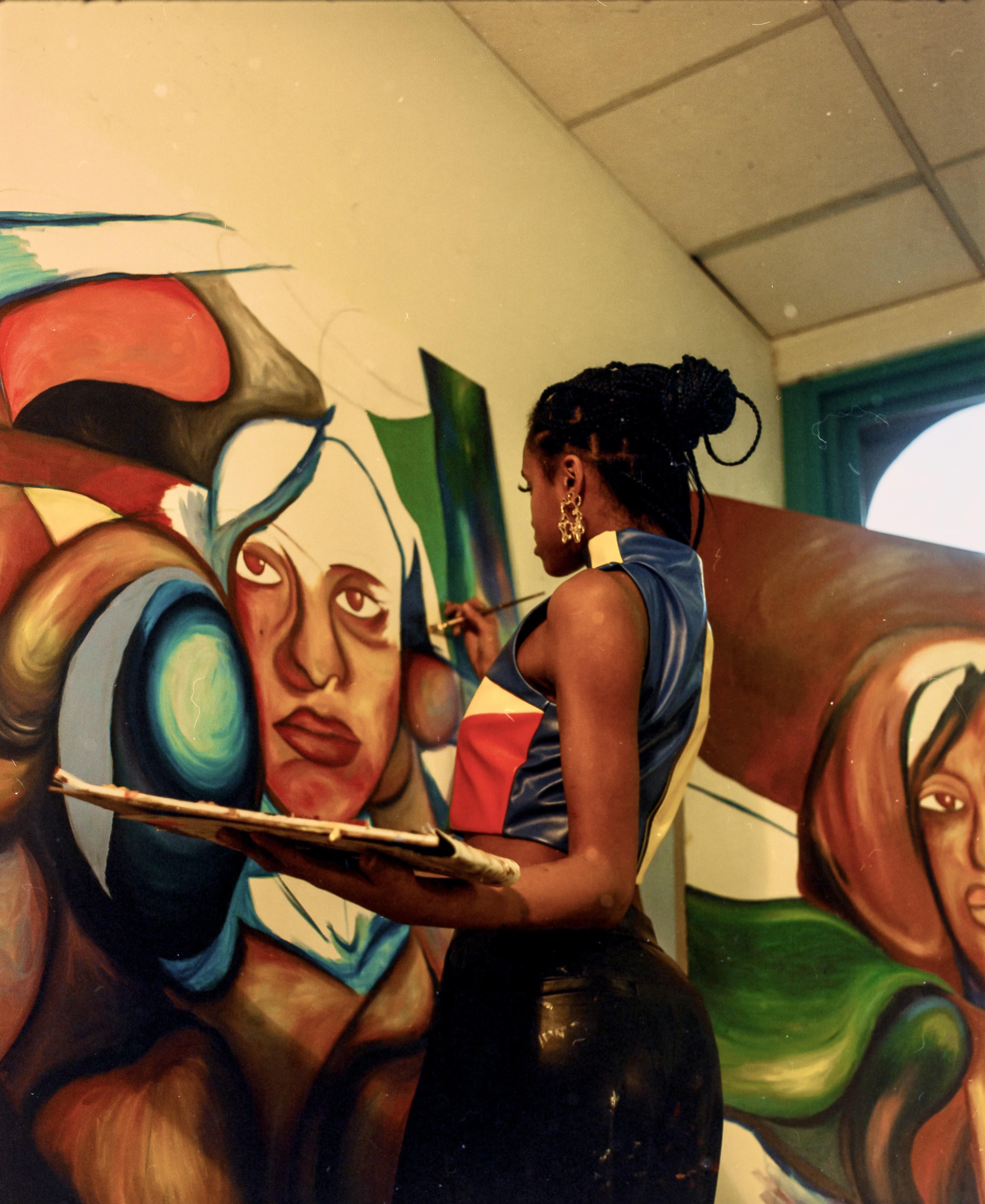
Meet SheROCKS 2026 Artist: Avanna Duff
Avanna Duff reflects on Girlhood, a deeply personal body of work shaped by loss, self-inquiry, and the ongoing process of becoming. After losing her mother at 19, Avanna found herself suspended in emotional limbo, navigating early adulthood while searching for clarity, purpose, and identity. Through abstraction, she revisits her girlhood as both a site of healing and reclamation, using layered forms and intuitive gestures to explore identity as fluid, non-linear, and ever-evolving.
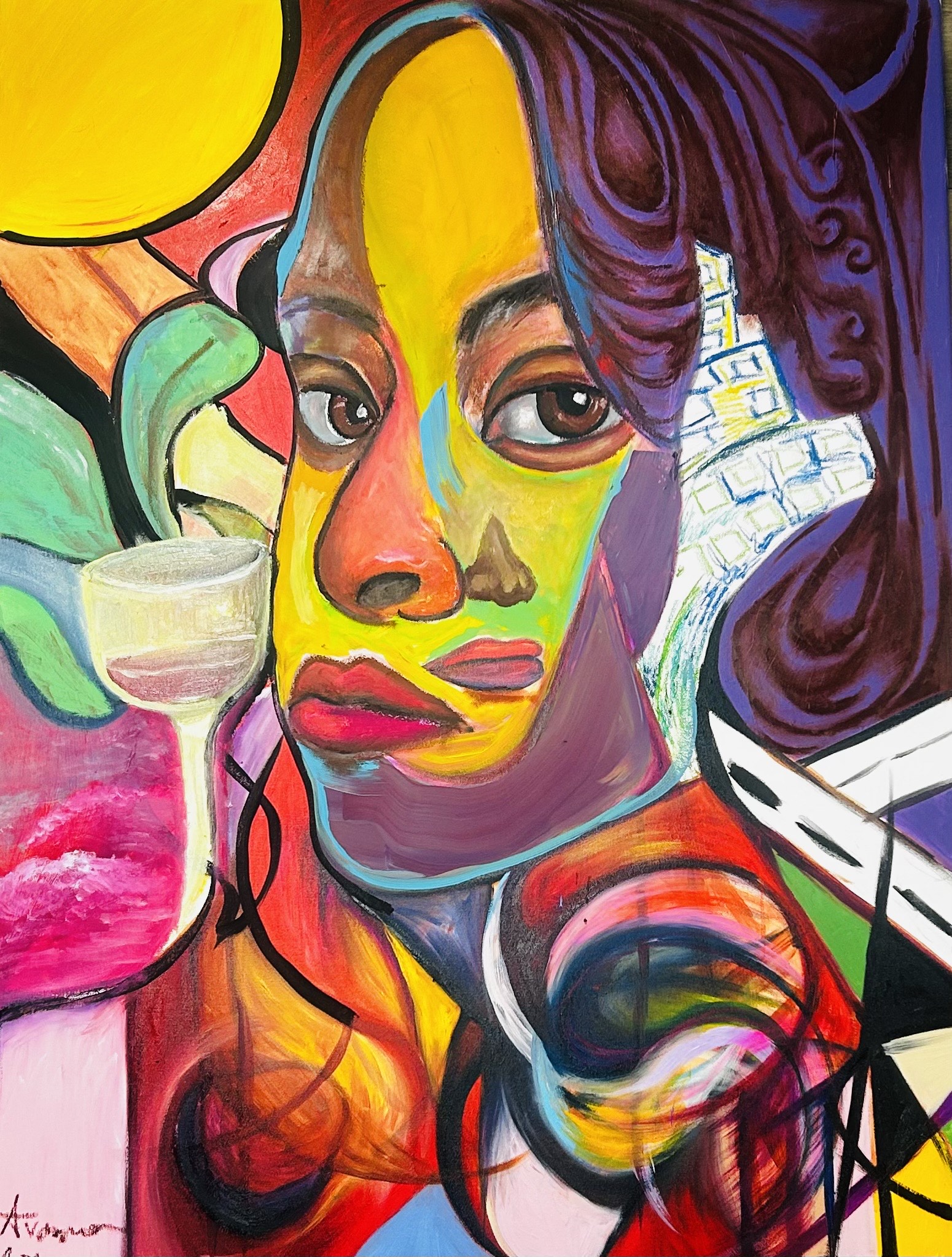
Q: Your most recent project “Girlhood” traces the inner shifts that shape womanhood. What was the first spark or moment that made you realize this was the story you needed to tell now?
Avanna: "Girlhood" represents a transformative journey of self-discovery and introspection, marking a turning point in my life. The sudden loss of my mother at 19 left a profound impact, causing me to feel stuck in a state of emotional limbo. As I navigate my early twenties, I've grappled with the challenge of rediscovering my identity and redefining my life's trajectory. Through revisiting my girlhood, I've been able to reconnect with my inner self, confronting the confusion and disillusionment that followed adolescence. This exploration has become a cathartic release, allowing me to reclaim my narrative and envision the woman I aspire to be. "Girlhood" is an invitation for others, particularly Black women, to reflect on their own stories, reclaim their voices, and embody their true selves.
Q: How did creating “Girlhood” challenge or expand the way you think about identity formation?
Avanna: For me, identity is a multifaceted construct shaped by internal reflections and external experiences, rendering it a dynamic and ever-evolving concept. Through my artistic practice, I've come to understand that identity formation is a non-linear, continuous process, with layers of meaning waiting to be uncovered. Unlike representational art, which can be readily understood, through abstraction my approach invites viewers to engage with the work on multiple levels, revealing new insights and perspectives. This layered narrative allows for a deeper exploration of the self, acknowledging that identity is a complex, ongoing conversation.
Q: This series speaks to the turbulence and beauty of becoming. Which piece in the, "Girlhood" collection feels the most personal to you, and why?
Avanna: A Tale Between Two Cities' is the piece that feels most personal to me in the 'Girlhood' collection. This work represents a pivotal chapter in my journey of self-discovery and artistic growth, capturing the turbulence and beauty of becoming. The decision to leave Atlanta and pursue my education in Buffalo, New York, was a deliberate choice to challenge myself and cultivate inner peace. Through this experience, I navigated the complexities of independence, confronting the pressures of solitude and the process of self-discovery.
This piece is a testament to the resilience and adaptability that have defined my path, as I strive to embody the best version of myself, both as an artist and an individual. It's a reflection of my journey, with all its triumphs and struggles, and serves as a reminder that becoming is a continuous process, often accompanied by uncertainty and self-doubt.
Q: You’ve shown work in celebrated spaces from Atlanta to New York. How have those artistic communities influenced your evolution as an artist?
Avanna: The artistic communities I've had the privilege of being a part of, from Atlanta to New York, have been instrumental in shaping my growth as an artist. Specifically, my time in Buffalo and Atlanta has been transformative. Buffalo taught me the value of community and the importance of connection, while Atlanta has reminded me of the power of roots and heritage.
This interplay between the two cities has been a catalyst for my evolution as an artist. Being in Buffalo allowed me to tap into a sense of resilience and determination, while Atlanta has grounded me in my identity and purpose. The contrast between these two environments has enabled me to synthesize my experiences and distill my artistic voice.
Through this journey, I've come to realize that my purpose is not tied to a specific location, but rather it's a culmination of the connections I've made and the lessons I've learned along the way. The artistic communities I've been a part of have instilled in me a sense of belonging and validation, allowing me to push boundaries and explore new creative territories. As I continue to grow and evolve, I'm grateful for the lessons and love that these communities have shared with me.

Q: Themes of empowerment and feminine strength appear often in your exhibitions. How do you approach expressing vulnerability without diminishing power?
Avanna: Embracing vulnerability is a fundamental aspect of my artistic practice, particularly when exploring themes of empowerment and feminine strength. For me, vulnerability is not a weakness, but a profound expression of strength that underscores the complexities of womanhood. It's about acknowledging the multifaceted nature of our experiences, and recognizing that our stories are both personal and universal.
Through my work, I strive to create a space where authenticity and honesty converge, allowing others to reflect on their own vulnerabilities and recognize that they are not alone. I believe that divine femininity is embodied in the diverse shapes, forms, bodies, curves, and lines that make up our world, and it's this diversity that gives us the power to redefine what it means to be a woman.By celebrating this diversity, I aim to contribute to a broader conversation that honors the full spectrum of feminine experience, acknowledging the vulnerability and strength that coexist within us. My goal is to create work that not only empowers, but also inspires empathy, understanding, and connection – ultimately, to create a sense of belonging that transcends individual stories.
Q: Many viewers see their own stories in your work. What role does audience interpretation play when you’re deciding how much of yourself to reveal in a piece?
Avanna: Audience interpretation plays a significant role in my creative process. I believe that art is a conversation between the artist and the viewer, and I'm drawn in by the mystery of knowing that people will bring their own experiences and perspectives to my work.When deciding how much of myself to reveal in a piece, I consider the balance between sharing my own story and creating space for others to insert their own narratives. I want my work to be relatable, yet open-ended, allowing viewers to find their own meaning and connection to the piece.I think it's beautiful when people see their own stories in my work, even if that's not exactly what I intended. It means that the piece has transcended its original context and become a part of their own narrative. In a way, it's a form of shared ownership – I'm sharing my story, and they're sharing theirs, and together we create a new understanding.Ultimately, my goal is to create work that resonates with others, and if that means revealing certain aspects of myself, I'm willing to be vulnerable in the service of connection. As an artist, I'm not just telling my own story; I'm creating a space for others to tell theirs.
Q: Your art steers avant-garde. What does “pushing the boundaries” look like for you as you continue to define your signature style as a visual artist?
Avanna: Pushing the boundaries means embracing vulnerability and risk-taking, allowing myself to be open and honest in my work, even if it makes me uncomfortable. It's about trusting my instincts and intuition, and being willing to fail or create something that doesn't quite work.I'm driven to transcend traditional notions of abstract art, redefining its meaning and representation in my generation. I'm committed to contributing to a legacy that builds upon the past, learning from it, and forging a path forward. My goal is to create art that sparks conversation, challenges assumptions, and inspires new perspectives – not just for my own growth, but for the artists who come after me.By pushing the boundaries, I'm staying true to my vision and staying excited about the creative journey ahead.
Rapid Fire: A color that instantly feels like “girlhood” to you — go!
Avanna: purple! :)
Q: What are you most excited for people to experience when they encounter your work at SheROCKS in March?
Avanna: I'm thrilled to be showcasing my collection at SheROCKS, and I'm confident that this event will be a pivotal moment in connecting with my peers and furthering the narrative of my art. I'm excited to share my work and be part of a community that celebrates women in visual and performing arts.
This event represents a significant opportunity for me to contribute to the conversation around identity, culture, and social justice, and I'm eager to hear the stories and perspectives of others. I'm looking forward to the connections and collaborations that will emerge from this experience, and I'm honored to be part of a movement that empowers women and amplifies their voices.
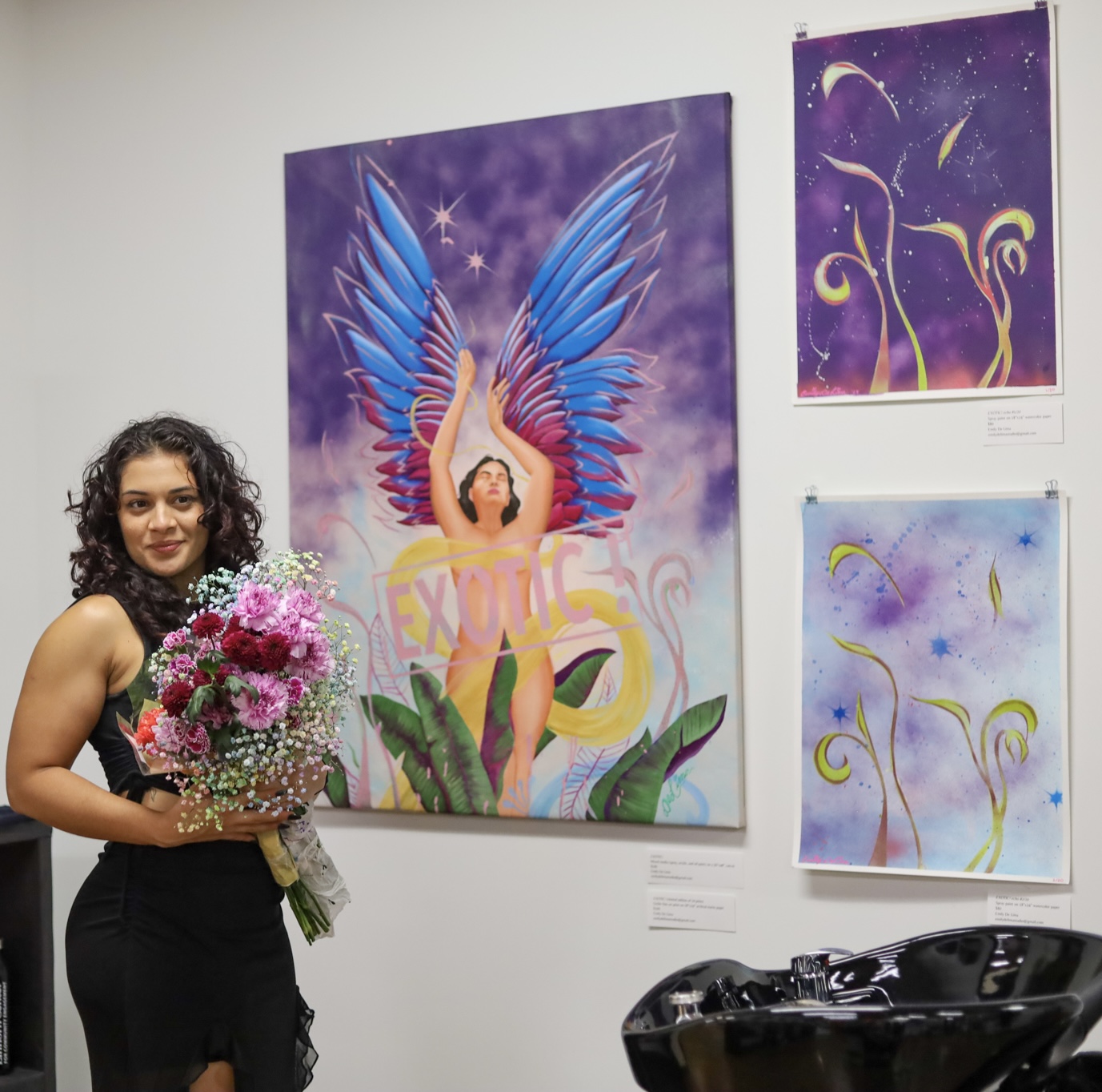
Meet SheROCKS 2026 Artist: Emily De Lima
Some artists choose a medium and others choose exploration. Moving fluidly between architecture, visual art, sculpture, and photography, Emily De Lima builds worlds from sketches, discarded materials, and spontaneous ideas. Now based in Queens after graduating from Cornell University’s architecture program, Emily is shaping a practice that refuses limitation and thrives on curiosity. In this Q&A, she shares how experimentation guides her process, why “jack of all trades” feels like a compliment, and how every piece, whether a small collage or a building-scale concept—begins as a prototype with room to grow.
Q: You’re a multidisciplinary artist with work spanning architecture, visual art, sculpture, and photography. How do you decide which medium becomes the best for a particular idea or moment?
Emily: Since I’ve never been able to stick to just one medium, I’m constantly experimenting. I like to pick things up and figure out how they work and what they can become. Sometimes an image flashes through my mind and I sketch it out, and those usually turn into paintings. Other times, I just look around wherever I am and see what materials I already have lying around. I love using things considered scraps or trash. I’ll start cutting things out and assembling them, and an idea grows from there.
Everything is a prototype. I’m just trying things out, seeing what works. Smaller pieces become whole, whether that’s the scale of a painting or a building. They say, “A Jack of all trades is a master of none, but oftentimes better than a master of one.” I think there’s something beautiful about not mastering just one thing—staying curious and letting the process guide where the work goes.
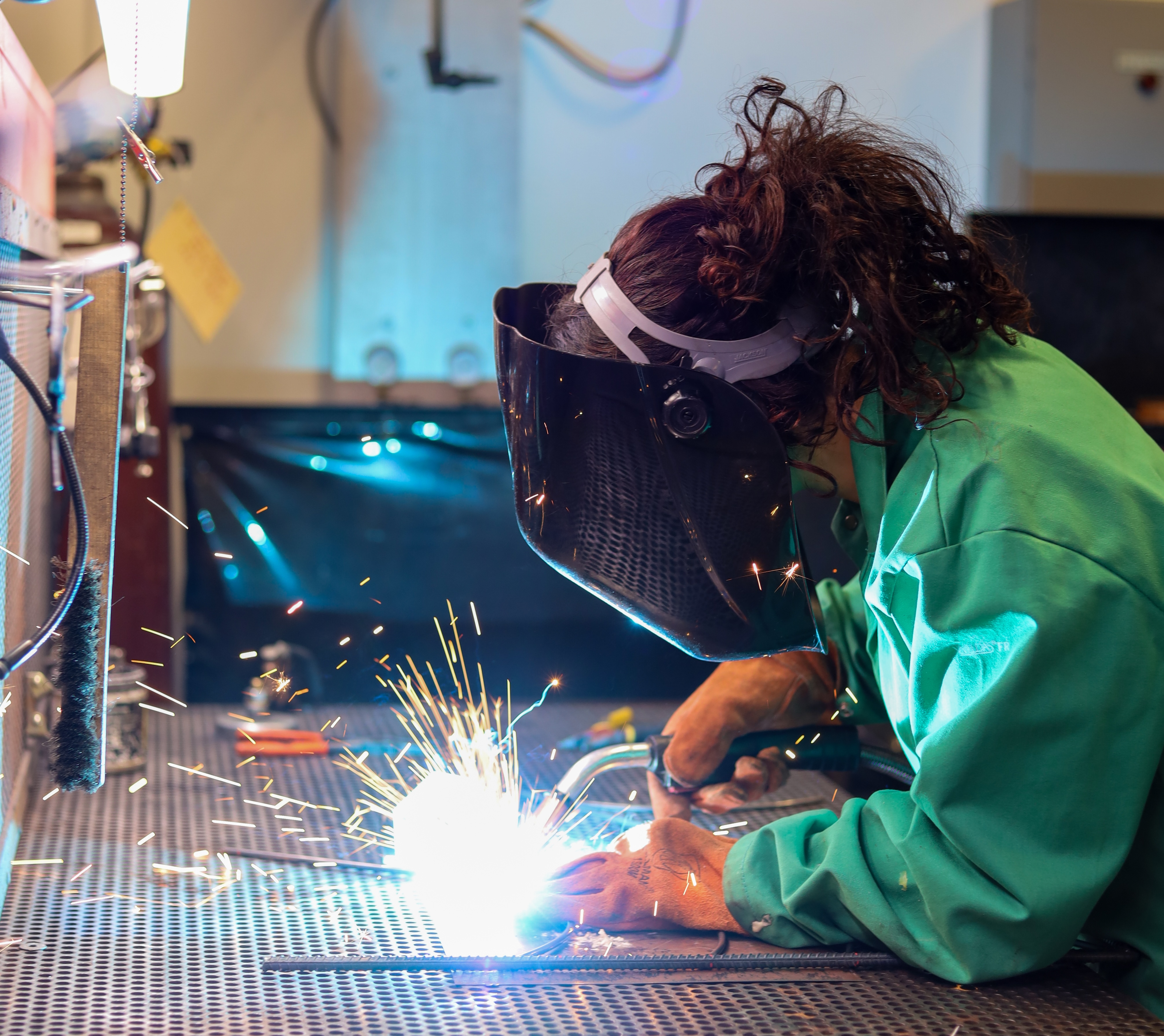
Q: Much of your practice focuses on origin and cultural sensitivity. How has growing up as a Brazilian woman in America shaped the way you interpret space, material, and narrative?
Emily: I think a lot about humans versus shells. How the outer layers we carry affect how people see us. These shells appear on many scales; in the spaces we occupy, the clothes we wear, even the ways we carry ourselves. Often, they get in the way of us truly seeing each other as human.
I’ve always been a bit of a nerd, but because I didn’t fit the typical visual stereotype, I often felt very “othered” in the spaces I’ve occupied. At Brooklyn Tech, the specialized high school I went to, only 7% of the student body was Hispanic/Latino while I was there, and I was frequently overlooked or stereotyped. At Cornell for university, I was again a minority and I faced similar assumptions. The way I look has affected how seriously people, especially men, have treated me, and I’ve had to work a lot harder to be heard.
I poured these experiences into creating “EXOTIC!”. This ended up being my first exhibited piece, where I drew a parallel to the Brazilian Spix’s blue macaw. The macaw was targeted for its striking blue color and rarity, making it a prized trophy in the illegal bird trade. It was captured and admired, but rarely understood. Their beauty essentially became their downfall, collectors captured them faster than the population could recover, pushing the species to the edge of extinction. I have often been treated in a similar way, as a shiny object that people want to be seen with, but not listened to.

Q: Your installation “What We Grow” investigates the lasting effects of colonization across Brazil and the Caribbean. What compelled you to take on this history, and how did the collaboration with Cornelius Tulloch shape the project?
Emily: “What We Grow” really started with an architecture option studio I took at Cornell Tech in 2023. We worked closely with Ena McPherson, a Jamaican woman who was a pioneer in the urban gardening movement in East New York. Getting to know her made me notice how much Brazilian and Jamaican culture overlap. That pushed me into researching how plants, traditions, and knowledge moved through the transatlantic slave trade and ended up forming the worlds we grew up in. The similarities weren’t coincidence, but were the result of people carrying their worlds with them under unimaginable conditions.
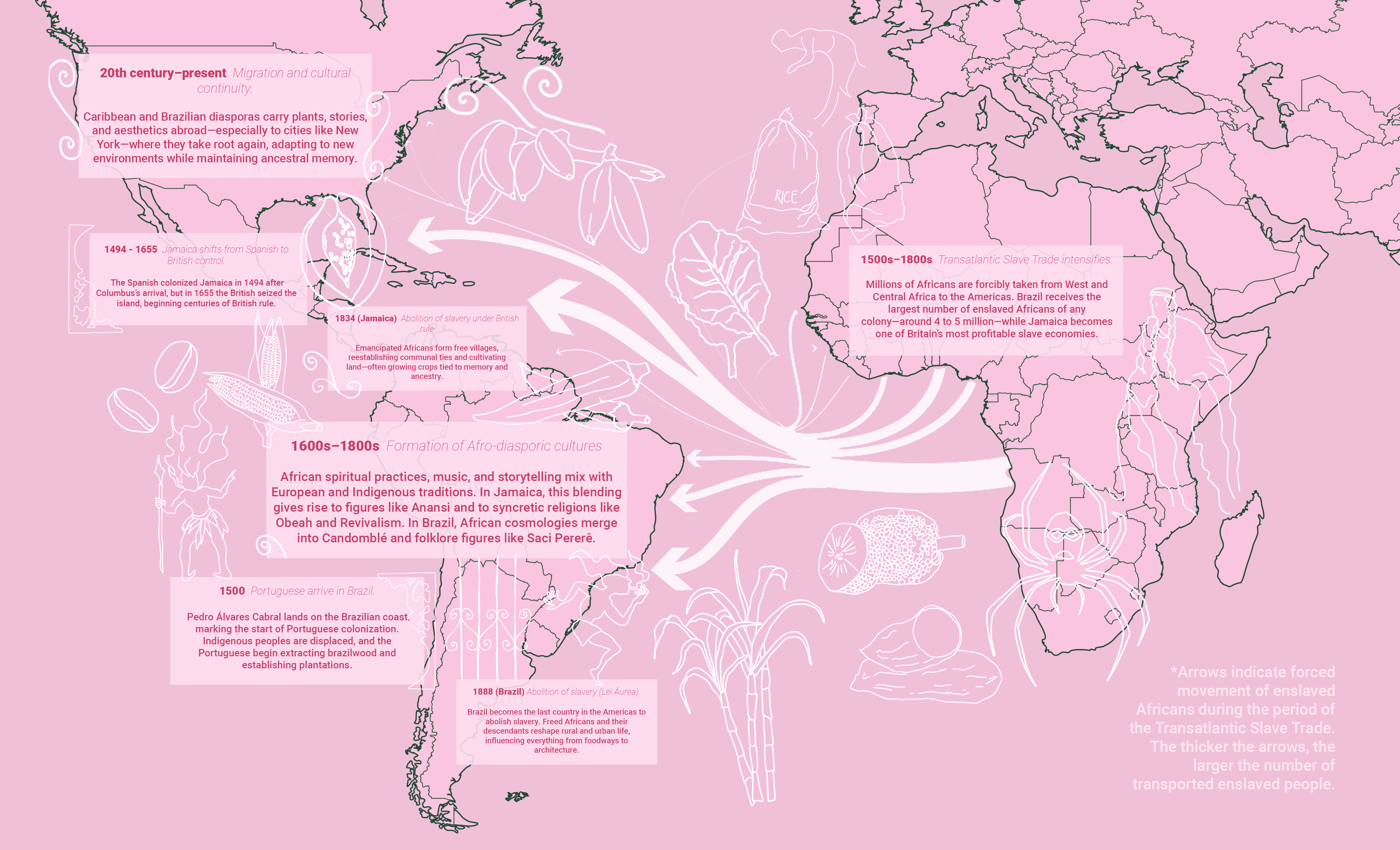
The collaboration with Cornelius Tulloch came naturally out of that. Cornelius was a former student of my professor, Peter Robinson, who’s career path blended art and architecture as I was aspiring to do. Peter saw the overlap in how we both think spatially and visually and encouraged the connection.
I applied to a grant opportunity through my school and was awarded to further the research I began in that studio. This culminated into “What We Grow,” a public installation that took place in Tranquility Farm in Brooklyn, NY.

Q: When you examine how knowledge is passed through craft and tradition, how do you see your own artistic practice contributing to that lineage of storytelling?
Emily: As times change, so do crafts and traditions. Existing practices are added to and transformed with new ways of making. For me, being Brazilian-American adds another layer to this as I’m constantly mixing influences from my Brazilian heritage with the culture I grew up with here in NYC. I’m particularly interested in how being an artist has also significantly shifted in a digital, hyper-capitalist age. It’s no longer enough to just be a skilled painter, you also have to build a presence, navigate both real-life and digital spaces, and find ways for your work to resonate in an oversaturated market. I want to make work that bridges traditional art and digital platforms.
Right now, I’m working on a short film where I take elements from physical pieces and adapt them for a digital video platform, exploring how craft and storytelling can evolve while still carrying the same lineage of care and knowledge.
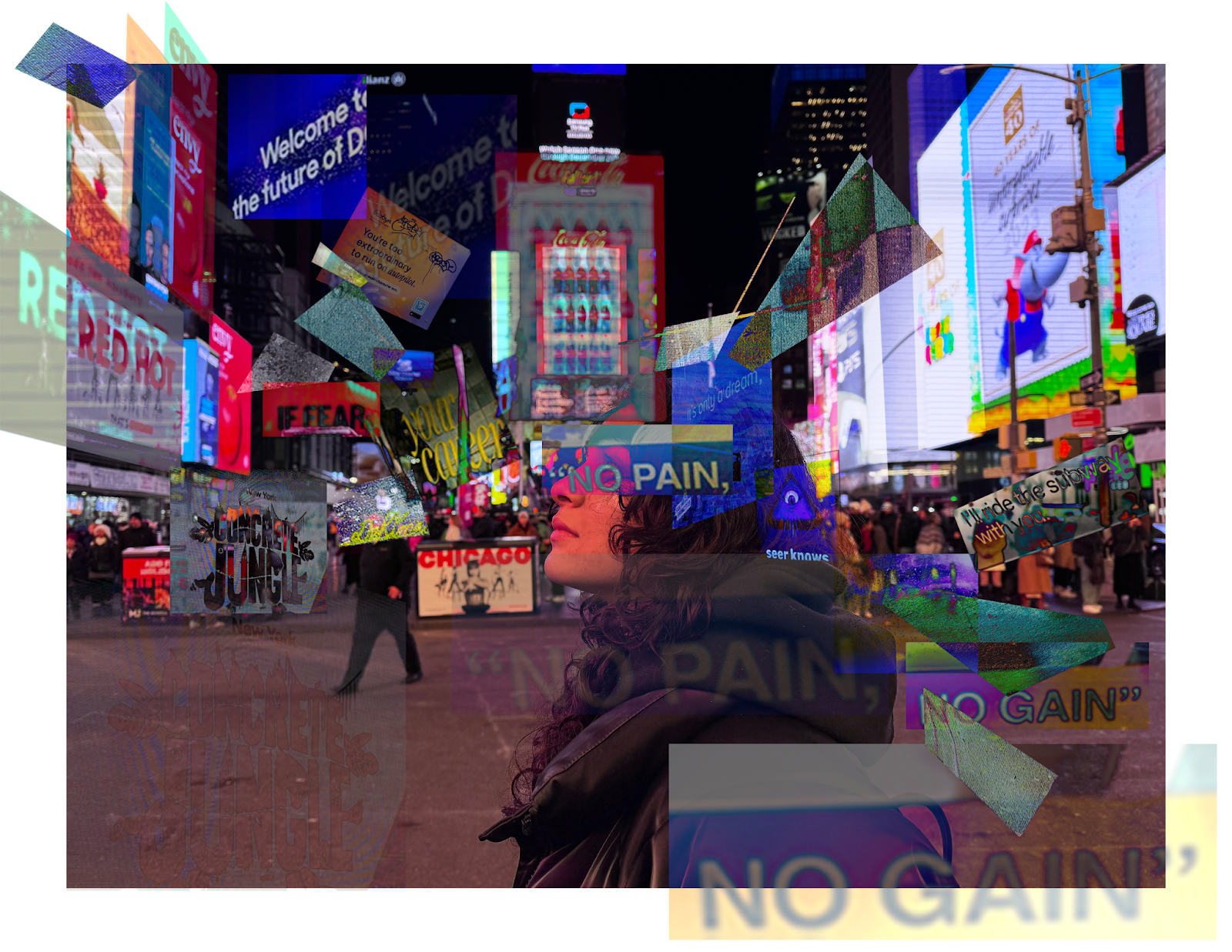

Q: With a background in architecture, how does spatial thinking influence the way you build worlds whether as installations, images, or objects?
Emily: Again, I think of everything as pieces that fit together to form a whole. From the screws that hold a structure together, to the columns that support a building, threads that keep fabric intact, layers of paint on a canvas. Every element matters, and everything connects in ways we don’t always expect. My process of building, testing, and letting the idea dictate its form comes directly from thinking like an architect, even when the work ends up on a flat surface.
Q: What questions are currently guiding your creative direction as you move into this next chapter of artistry?
Emily: I grew up in a very Catholic household and went to Catholic school from pre-K to 8th grade. I was always the kid asking too many questions, and that curiosity wasn’t really encouraged. For a long time, that pushed me to reject religion altogether. Now, I’m in a place where I’m reevaluating a lot of it. I’ve studied bits of different belief systems, and I’ve started building my own understanding of spirituality, one that mixes my appreciation for science with the way I see nature and the universe function.
The questions guiding me now are about how humans create meaning, how we inherit stories, and how we rewrite them. I’m interested in how identity is shaped by the things we’re taught versus the things we discover on our own. Those themes have already started appearing in my recent work, and I think they’ll keep leading me forward.
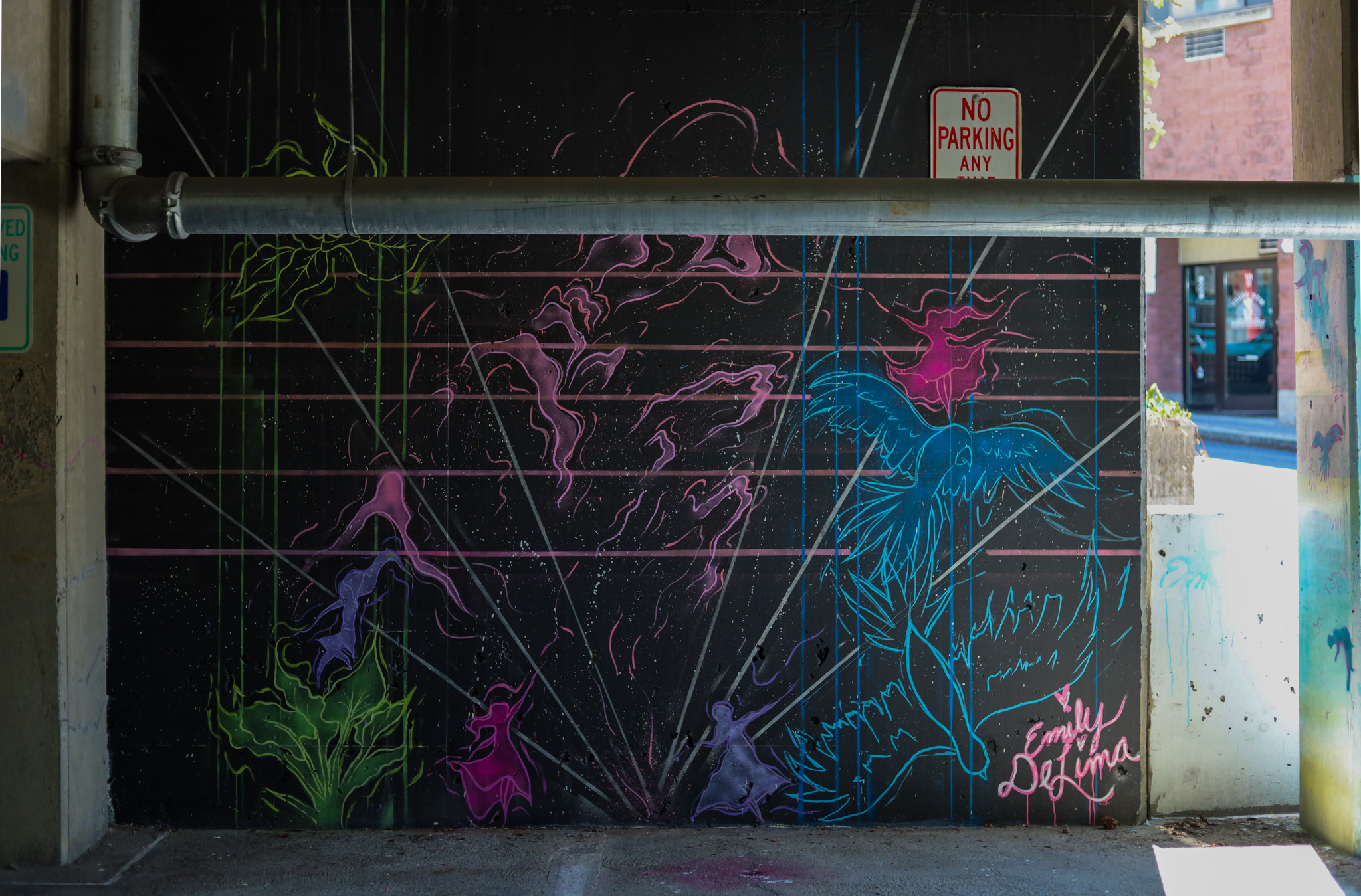
Rapid fire: One material you could work with forever — go!
Emily: Spray paint! I love the messy drips and how you can play with splatters and flicks. It lets me work fast, and experimentally, but it also forces me to adapt and embrace accidents.
Q: What are you most excited for audiences to feel or discover when they encounter your work at the March 2026 SheROCKS showcase?
Emily: I’m excited to finally push my way into the art world. I graduated just last May, and since then I’ve been pouring myself into making new work and getting it out there. I’m looking forward to giving the audience a glimpse into my chaotic brain. I have a million ideas and I can’t turn them off.
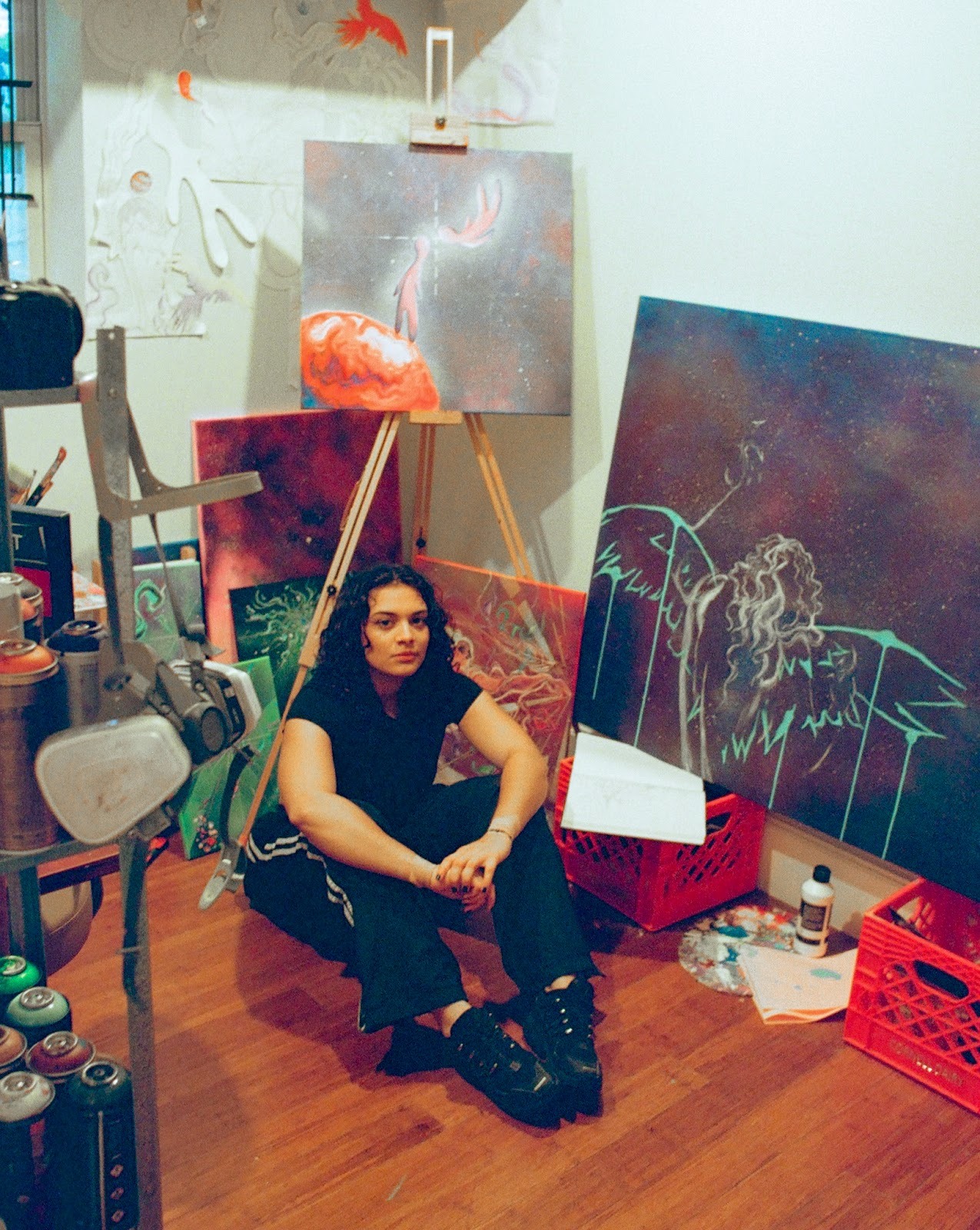
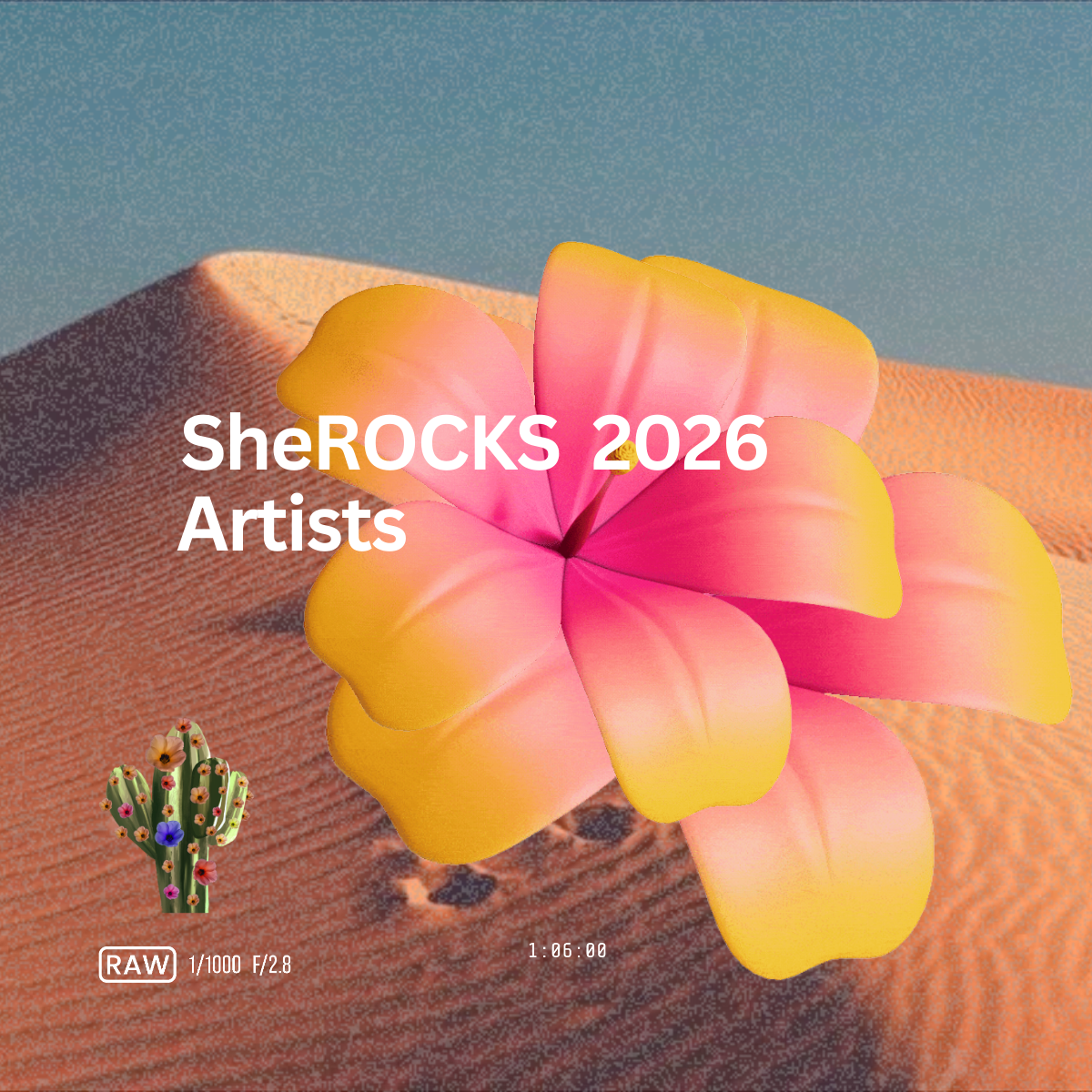
Introducing Your SheROCKS 2026 Showcase Artists
Talent deserves more than recognition, it deserves a stage. We're thrilled to announce our SheROCKS 2026 showcase artists:
Ainae, Singer/Songwriter
Avanna Duff, Visual Artist
Camille Fleur, Singer/Songwriter
Brianna Chantel Woodard, illustrator
Emily De Lima, Multidisciplinary Artist
Leah Humphrey, Singer/Songwriter
Cybèle, Singer/Songwriter/Composer
Ren Wright, Singer/Musician
Emily Alff, Photographer
Lilo Marz, Spoken Word Poet
Makhyli, Singer/Songwriter
LaTeisha Melvin, Dancer
Tori Carlisle (TzoArt), Visual Artist
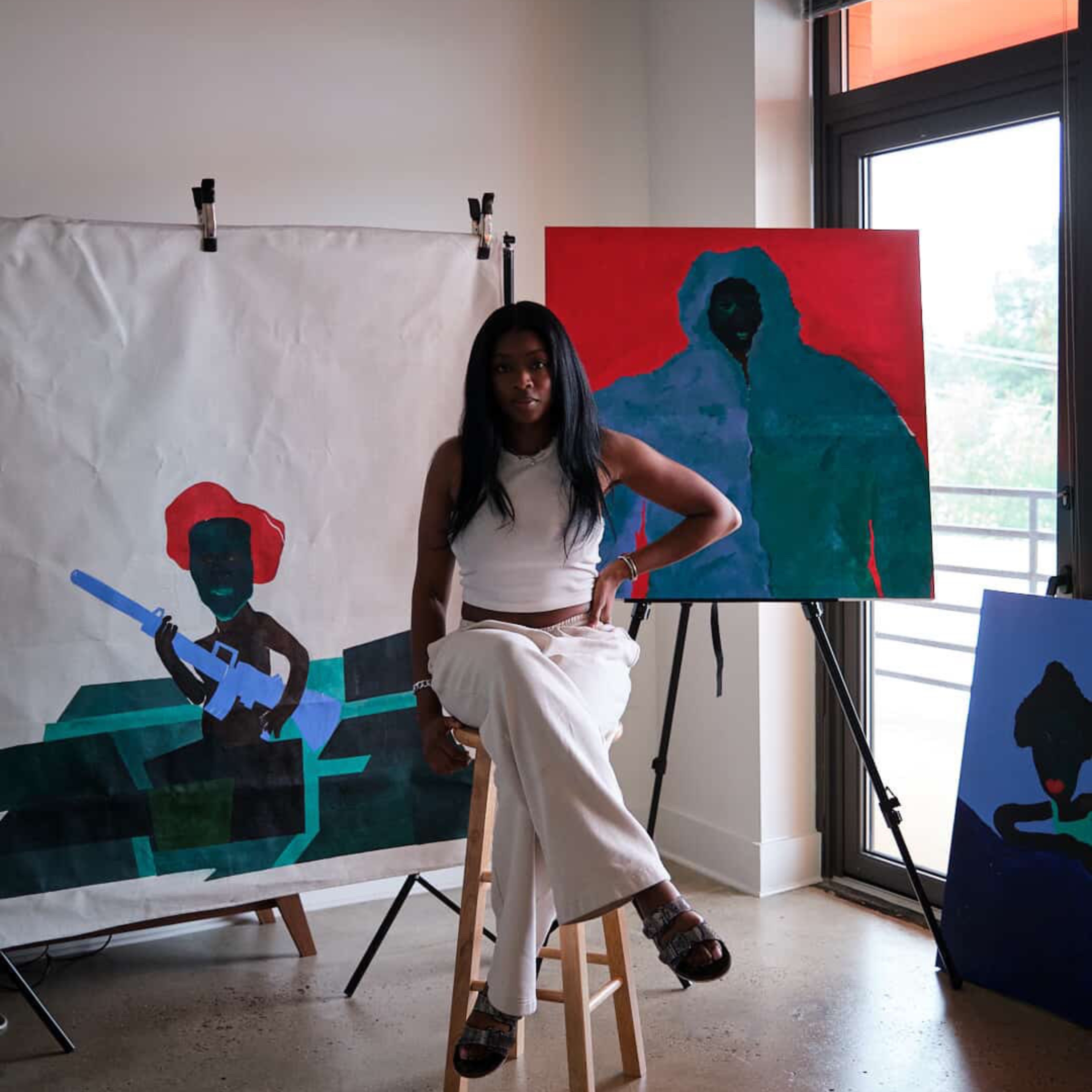
Hardwiring memories and Cementing Connection Through Art: Meet Dandora Sillah
Walking through the Hammer’s biennial exhibition Made in L.A., curated by Essence Harden and Paulina Pobocha, I paused when I arrived at these pinwheel-like frames. Gravitating toward floral-shaped objects is almost instinctual for me. From trying to suck nectar from honeysuckle flowers to grabbing handfuls of sunflowers in the summers as a kid, the shapes are nostalgic.
These photo frames — pieces of someone else’s life — gave rise to that same nostalgia. Flashing back to the open field of pinwheels in Kansas City I saw on the cross-country drive from Maryland to L.A. with my mother, my mind connected Widline Cadet’s Shifting Skies (2025) to my own mental archive of memories and experiences I hold close. “When’s the last time I flipped through the family albums at my parents’ house?” I thought.
Cadet’s photographs became a time capsule taking me back to grabbing huge albums falling apart, photographs separated by endless pages with rectangular plastic slots, and negatives tucked into envelopes throughout the pages.
If we observe closely, art has a way of bringing up memories that are hardwired at the core of our being. Rising multidisciplinary artist Dandora Sillah has translated personal and emotional memories into visual storytelling through her artwork — work that also evokes a sense of connectedness to the memories, places, and experiences that resonate with us most.
Timea Faulkner: Walk us through your creative process. Are there any rituals, sounds, or visual references that ground your work?
Dandora Sillah: It often starts with something I notice in the world today. A moment or feeling can trigger a memory from years ago, or even connect me to something I've learned about the history of Sierra Leone. Sometimes what inspires a piece isn't something that happened to me personally, but something I witnessed or felt deeply. When that happens, the colors, smells, and emotions come rushing back, and I translate that energy into a visual story that bridges past and present. A moment will often take me back. Maybe something I see, hear, or feel that suddenly reminds me of a time in my life or someone close to me. From there, I start sketching what I remember, letting that image grow into a painting. If the memory feels blurry, I'll look at a reference just to capture the movement, but once I begin, I'm locked in. I don't need music or anything else around me. I'm completely present, having fun, and everything just starts to flow as the memory comes to life on the canvas.
Timea Faulkner: You often describe your work as rooted in your West African heritage and your experience growing up between cultures. When did you first begin to see those influences showing up in your art?
Dandora Sillah: I began to see those influences when I set out to paint a face that gradually became a mask. In that moment, I recognized the mask as a reflection of myself, shaped by living between my African and American identities. It revealed how I was often perceived through different lenses and guided me toward using art as a way to explore identity and belonging. Growing up in Brooklyn and being Sierra Leonean deeply shaped how I see the world. I went from attending a school where I was the only Black girl in my class to later being surrounded by many cultures; Jamaican, African, and all shades of brown. That shift opened my eyes to the beauty of diversity and helped me understand identity in a broader way. In Brooklyn, it was easier to tap into culture, and that sense of community and difference continues to influence how I translate my experiences into art.
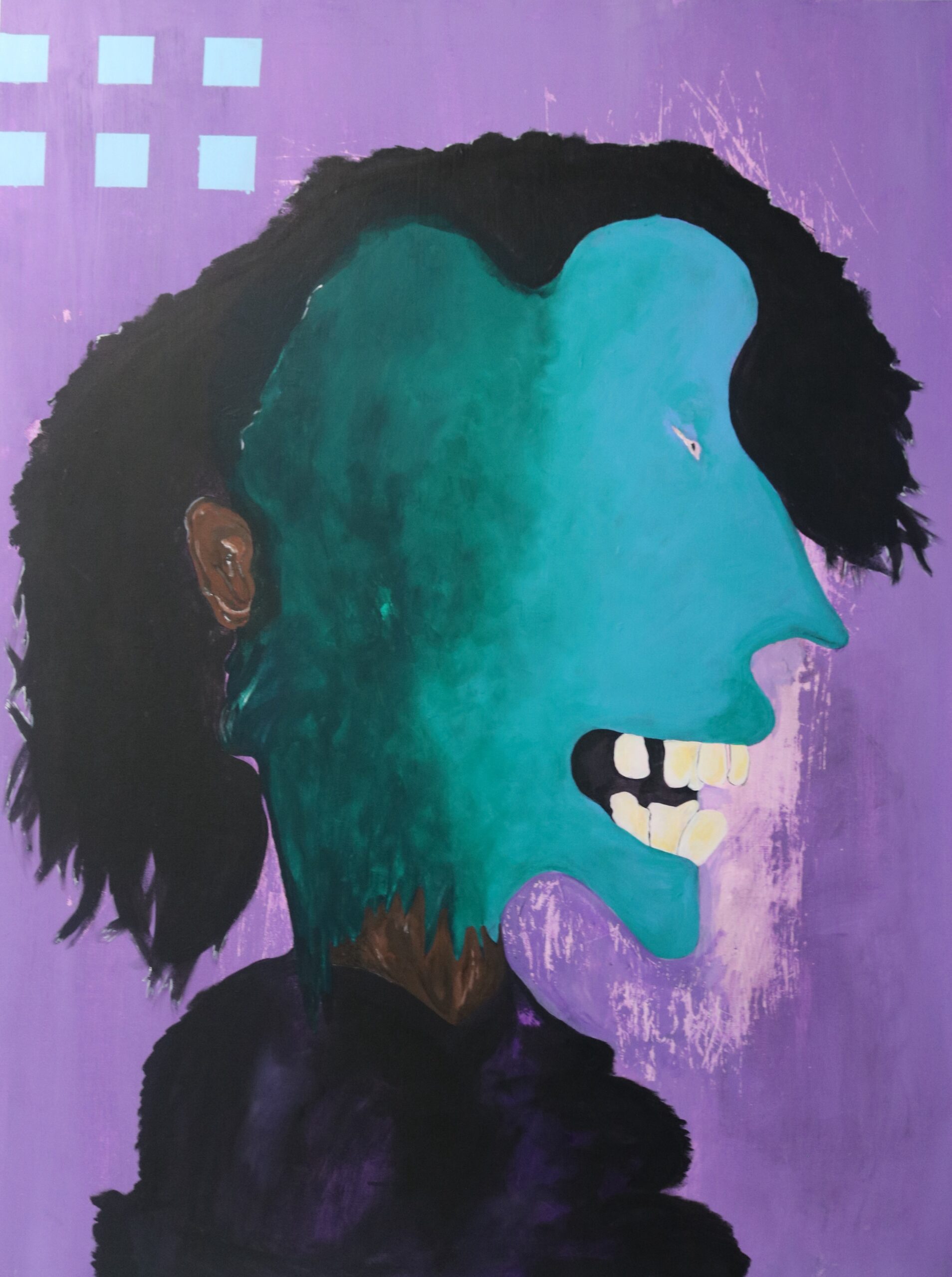
Timea Faulkner: As an artist who works across painting and illustration, how do those mediums speak to each other in your process?
Dandora Sillah: Illustration is where the story begins for me. It helps me shape the narrative, the characters, and the meaning behind the work. Painting is where the feeling comes in. I love working with texture; it's what brings the story to life and gives the art emotion and depth. Together, they allow me to connect both storytelling and feeling in one piece.
Timea Faulkner: I’ve read that Delphine Adama Fawundu is an influence of yours. What about her work or approach speaks most to you?
Dandora Sillah: Delphine Adama Fawundu inspires me because she stays deeply connected to her culture and is intentional with texture and color. She travels to capture real experiences and references for her work, and watching her approach reminds me to stay committed, to keep exploring, and to let my own art grow with the same care and purpose.
Timea Faulkner: Are there other artists, mentors, or cultural figures who’ve shaped your artistic journey in unexpected ways?
Dandora Sillah: Yes! Mentors like Frances Fawundu, who is also an art therapist, has shaped my journey in unexpected ways, showing me how art can heal and connect people. Jacob Lawrence is another huge influence. His use of shape, color, and history, especially in depicting life during the Great Depression, inspires how I tell stories through my own work.
Timea Faulkner: Most recently, you participated in DC Design Week. The DMV has such a vibrant arts scene with strong diasporic roots. How has being part of this community shaped your practice or opportunities?
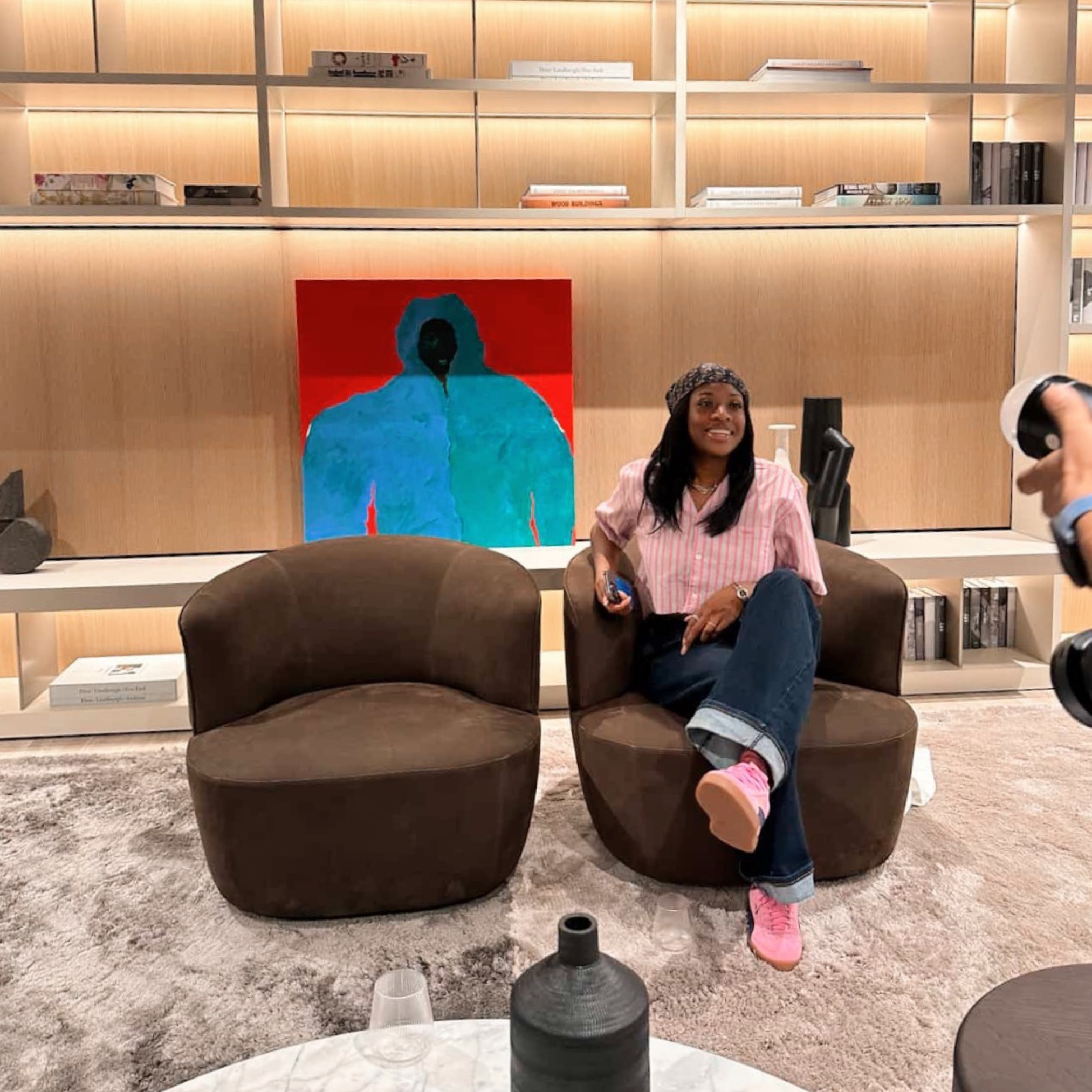
Dandora Sillah: I’ve lived in the DMV area for about ten years, even though I’m not originally from here. The area has become a part of me, and I’ve learned so much from its community. I work with children, creating art with them and sharing my own pieces to inspire their creativity. Participating in DC Design Week brought a strong sense of appreciation for my work, which motivates me to continue engaging with the community and expanding my presence here.
Timea Faulkner: As an emerging artist, when people encounter your work for the first time, what do you hope they walk away feeling or remembering?
Dandora Sillah: I hope people walk away understanding the story I'm telling. I hope they feel seen in their own experiences; whether it's being misunderstood, going against the grain, or being the "black sheep." Even if my work draws from specific cultures or memories, I want it to reach anyone who has ever felt different or out of place, to remind them that their experience matters and can be celebrated through art.
About the Artist
Dandora Sillah is a multidisciplinary artist based in the DMV area. Born in New Jersey and raised in Brooklyn by Sierra Leonean parents, her work is deeply rooted in her West African heritage and the experience of growing up between cultures. Through painting and illustration, she transforms memories of family, friends, and childhood into visual stories that explore identity, belonging, and the emotional landscapes of Black and immigrant life. Influenced by photographer Delphine Adama Fawundu, Dandora's practice reflects an ongoing dialogue between cultural memory and contemporary expression. Her work often weaves together personal narratives with elements of pop culture, highlighting how tradition and modern life intersect in shaping identity. She studied at Mercer County Community College before earning her degree in Graphic Design from Bowie State University. Her art serves as a visual archive; celebrating love, lineage, and the layered beauty of everyday existence.

SOFemArt Top 25 Influential Women in The Arts, Creative Industries, & Tech
.png)

Instagram: @pollyirungu

Instagram: @artfullyawear

Instagram: @komalshahgarg

Instagram: @museummammy

Instagram: @karynlovegrove


Instagram: @natashacr

Instagram: @suzywillow

Instagram: @massahdavid

Instagram: @miattajohnson

Instagram: @courtneyewhitaker


Instagram: @shexshe

Instagram: @elevatedtrash

Instagram: @charlottetaylr

Instagram: @tegaakinola

Instagram: @enyleeparker


Instagram: @thepocketqueen

Instagram: @hammondgal

Instagram: @almostfamous09

Instagram: @besidone


Instagram: @yvettemayorga

Instagram: @hueman_

Instagram: @cecephilips

Instagram: @almendrabertoni

Instagram: @mattaniah.makes

SheROCKS w/ C.R.O.C. Presents "Creative Oasis": A Mindful Art Residency in Glassboro, NJ
FOR IMMEDIATE RELEASE
Glassboro, NJ - January 8, 2024—The State of Fem Art, in collaboration with The Better Giveback Foundation Inc., proudly announces the second edition of its transformative artist residency SheROCKS with C.R.O.C. program, "Creative Oasis." Centered around the theme of mindful creativity, the residency will take place from March 20-23, 2024, in the heart of Glassboro, NJ, a vibrant college town steeped in the history of the glassmaking industry.
Building on the success of the inaugural program in March 2023, "Creative Oasis" is a 3-day immersive experience tailored for collegiate-age women artists. The residency, a collaboration between The Better Giveback Foundation, Inc.'s Creatives on Campus work-study program and The State of Fem Art's SheROCKS event program, aims to provide a unique blend of artistic expression, creative exploration, personal growth, business development, and community building.
In a joint statement, program founders Brittanie Thomas and Timea Faulkner said, "This program is an investment into the future of the arts. The ripple effect of mindful creativity extends beyond the residency, influencing the participants' artistic practices and, in turn, the broader creative community. We strive to foster a culture of mindful creativity that empowers collegiate-age women artists to unleash their full artistic potential."
"Creative Oasis" is designed to inspire and celebrate the fusion of mindfulness and creativity. Participants will embark on a journey of exploration, delving into the depths of their artistic selves. Through carefully curated workshops, discussions, and collaborative projects, the residency fosters an environment that encourages self-discovery and cultivating a deeper connection between art and mindfulness.
The residency culminates in an exhibition showcasing the participants' creations through visual and performance art during Women's History Month. Attendees will get to explore a diverse array of thought-provoking, emotionally resonant artworks that embody the theme of mindful creativity by four creatives who have completed the residency.
To apply for the residency, artists can complete the application: https://bit.ly/SRWC-Application
For media inquiries and interviews, please contact:
T. Gaines
Love Life Media
T.gaines@lovelifemedia.com
About SheROCKS w/ C.R.O.C.
SheROCKS w/ C.R.O.C. is a collaboration between 501(c)3 The Better Giveback Foundation's Creatives on Campus program and The State of Fem Art's SheROCKS event program, dedicated to providing immersive arts programming and fostering creativity in post-secondary educational settings.
###

Are We Really Doing Better by Women in the Arts?
On January 7, 2018, women made history in the arts community. The internet was ablaze with talk of Oprah Winfrey running for president after her Cecil B. DeMille Award acceptance speech went viral. Many attendees at the Golden Globes wore black to support the #MeToo movement.
Reports in the media hailed the event as a triumph for women, but was this really the case? In that year, there were only four female nominees for the Golden Globes. According to women and Hollywood, the 325 nominees for the 2022 awards were almost entirely male (91.1%). There were 29 nominees, but only nine were women, and only three were women directors from traditionally underrepresented groups who took home awards.
It is our duty to work towards a more just and equitable industry. This is especially true in the arts and entertainment fields, where discrimination is still common due to deeply ingrained cultural and social norms. Let’s talk about the current situation of women in the arts and call attention to the gaps that still exist. We will continue to emphasize the role of women in the arts, and we'll talk about how you can get involved. We're hoping this helps you understand the gravity of why advocacy and allies for women artists is critical and moves you to action.
How Have These Disparities Persisted for So Long?
Since the early days within the arts, women have been working diligently in various capacities. Yet, they continue to face disparities in pay and recognition. Researchers at Williams College recently looked at the collections of the most important art museums in the United States. They found that only 13% of the artists in those collections were women. But according to information from the job site Zippia, about 55% of artists who work in the museum are women.
This is a problem that needs to be addressed. Art spaces should have collections representative of the women who are also working in those museums. We need to have more discussions about the role of women in the arts and how to best support them from the curators to the artists. This includes encouraging girls and women from a young age to pursue an artistic career. By raising awareness around these issues, we can progress toward a more equitable future for women in the arts!
What Are the Disparities in the Arts and Entertainment Industries for Women?
According to FORBES, Between 2008 and 2019, an estimated $196.6 billion was spent at art auctions, but only $4 billion went to women artists.
Men largely dominate the arts and entertainment industries. This is true not only for actors and directors but also for stage managers and production assistants. As a result, women face many disadvantages within these industries. These disadvantages can dramatically impact their careers - even when they reach the top levels. Lack of visibility is one of the main problems women face. This is because women are often underrepresented in the media, reviews, and ratings.
Gender bias and sexism are also big issues, as women often experience discrimination and inequality. However, there's still a long way to go before parity is achieved in the arts. We must continue working hard to achieve it, starting with awareness and understanding.
The Strides Being Made by Women in the Arts
The world of the arts is complex and diverse, and it's no wonder that women have had a hard time breaking through the glass ceiling. However, there's been some progress made in recent years. The Center for Women in Television and Film reports that women have made great strides in the entertainment industry, with more women working in behind-the-scenes roles and more female artists achieving mainstream success.
Women comprise most professional art museum staff; but despite recent gains, they remain underrepresented in leadership positions. Again, there is still a lot of work to be done. The importance of women in the arts cannot be overstated. They have been essential in shaping our society and culture for generations.
They continue to make valuable contributions to art, dance, music, literature, and we need them more than ever. It's time we started taking action and supporting women in the arts. Women need more opportunities to get exposure and gain recognition for their talent. We need to support their work intentionally so they can make even more progress in the future.
The Challenges That Remain for Women in the Arts
The arts is important for both individuals and society as a whole. Art can help us express ourselves in ways that are unique and can offer therapeutic benefits. However, many challenges remain for women artists.
- The National Museum Women's Association reports that from 2005 to 2015, the percentage of museums headed by women increased from 32% to 47.6%, though this increase was concentrated among the smaller institutions.
- According to Billboard. women are undervalued in the music industry and do far too much work. 57% of those polled work more than one job, 24% work 40-51%, and 28% work more than 50%. Approximately one-third of those polled earn less than $40,000 annually, and nearly half believe they should be further along in their careers.
- One of the hardest things for women to do in the design industry in 2022 is to find strong role models. According to the National Museum Women's Association, Women make up a majority of professional art museum staff; despite recent gains, they remain underrepresented in leadership positions.
.
To make real progress, we need to be more aware of the challenges that exist and take action to address them. We need to support women artists and help them reach their full potential. This will be challenging, but it's essential to see real change in the arts industry! Thankfully, people are working collectively to change these things.
The arts are a part of our history and culture and should be inclusive for everyone. Arts are a powerful medium for expression and can help break down barriers. Unfortunately, women have been largely left out of the arts scene -more specifically in equal pay and opportunities. That's why it's so important that men play a significant role in advocating for women in the arts. Here’s how men can help to support women artists.
- Realize that there is no one cause of inequality but many. Do your research and learn the space you wish to influence.
- Address toxic masculinity in creative and work spaces.
- Spread the word about and pay for the work of women artists.
- Cultivate the talent of skilled women artists by offering opportunities.
- Work alongside women in the arts. If we work together, we can give everyone a place to share their ideas and make sure that everyone can also enjoy great art.
The art world is full of women who have worked hard and succeeded at the highest levels. These women are leaders in their fields, reaching new heights every day. But we still have a long way to go before women are treated equally and fairly. Despite all the progress we've made as an industry (for better or worse), there's still more work to do regarding gender parity in Hollywood and beyond—and now more than ever, we need your help! We would love to hear from you!
If you’re a woman artist, let us know how we can support you by taking our survey. If you want to learn how to support women artists, join the conversation by subscribing to The State of Fem Art podcast.

E06 – Deborah Anderson | Diversity in Animation & Protecting the Creative Spirit

E05 - Eliana Reyes | Body Positivity, Being Afro-LatinX in the Film Industry, and The Representation of LatinX People in Media

